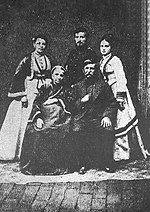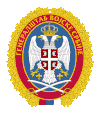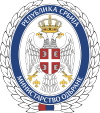Radomir Putnik
Minister of Army | |
|---|---|
| In office 17 April 1906 – 30 March 1908 | |
| Prime Minister | Sava Grujić Nikola Pašić |
| Preceded by | Sava Grujić |
| Succeeded by | Stepa Stepanović |
| In office 26 January 1904 – 16 May 1905 | |
| Prime Minister | Sava Grujić Nikola Pašić |
| Preceded by | Milan Andrejević |
| Succeeded by | Vasilije Antonić |
| Personal details | |
| Born | 24 January 1847 Order of Saint Michael and Saint George (full list in the article) |
| Military service | |
| Allegiance | |
| Branch/service | Serbian Army |
| Years of service | 1861–1896 1903–1917 |
| Rank | |
| Battles/wars |
|
Radomir Putnik
Biography
Family background and early career

The Putnik family was originally from
Putnik became a professor in the
Rehabilitation under Peter I
Putnik was rehabilitated following the
World War I

Caught in
In early 1915, Prince Alexander insisted upon assuming direct command of the army from Putnik. Putnik refused to abide by request, arguing that it was unconstitutional and that a monarch could not assume such a responsibility.[4]
The Serbian front then remained relatively quiet until autumn 1915, when joint Austro-Hungarian, German and Bulgarian forces, led by German Field Marshal August von Mackensen, began a large offensive against Serbia with more than 300,000 soldiers. Before the joint attack, Putnik warned the Serbian government that Bulgaria was concentrating her troops at the eastern Serbian borders and that a preventive attack on Bulgaria was the only chance for Serbia to avoid fighting on two fronts. His demand was rejected due to the wishes of the Allies, who were still hoping to isolate Bulgaria from joining the Triple Alliance. Despite heroic resistance, the Serbian troops were obliged to retreat towards Kosovo. On 31 October, Putnik ordered a general retreat onto Kragujevac, attempting to keep his exhausted army together as it sought to escape into friendly territory. Many of Putnik's soldiers were farmers, who occasionally slipped away from the retiring army to resume their rural lives. Putnik's rapidly declining forces continued their withdrawal towards Albania during the first week of November 1915, a process aided by the fact that the Germans, Bulgarians and Austro-Hungarians were reluctant to pursue Serbian troops through the highlands of Albania. The Germans felt that the war against Serbia was won, with most of the nation under the control of the Central Powers. Regarding the Russian Empire as the main threat in the East, Mackensen was eager to move his forces back to the Russian front. The Bulgarians were satisfied with their territorial gains in Macedonia and southeast Serbia, while the Austro-Hungarians were equally content with the notion that the Bulgarians were not moving to establish a Greater Bulgaria.[5]
The final confrontation occurred in Kosovo, the
, along with the core of the army.Dismissal and death
In the atmosphere of recrimination that followed between the Serbian Government and the High Command, the entire General Staff was dismissed in January 1916, including Field Marshal Putnik. He felt embittered, having learned of his dismissal from a cashier who gave him his salary without a Chief of General Staff's supplement. He traveled to Nice, where the French authorities welcomed him with honors and gave him a villa. Putnik was overcome by lung emphysema and died on 17 May 1917 without seeing his homeland again.[8] His remains were transferred to Serbia in November 1926 and buried with honors in a chapel at Belgrade's New Cemetery. The grave carries the epitaph "Grateful Homeland to Radomir Putnik".
Legacy
Mount Putnik in Alberta, Canada was named after him in 1918 for his exceptional services to the allied cause.[9] He is included in The 100 most prominent Serbs.
Military career




- Commander of 3rd Mountain Battery, January 1867
- Commander of Čačak Battery of People's Army, October 1868
- Commander of 4th Mountain Battery, April 1867
- Commander of Merzetska Battery, February 1871
- Duties at Artillery inspection, October 1872
- Duties at Department of the Artillery, January 1874
- Chief of Artillery Factory at Kragujevac, 1875
- Adjutant I class of Rudnik Brigade, April 1876
- Chief of staff of Rudnik Brigade, June 1876
- Commander of Rudnik Brigade, 1876
- Commander of Vranje Military District, 1878
- Duties at Artillery Department of Ministry of the Military, 1879
- Chief of staff of Division of standing army, 1880
- Commander of Toplica Military District, April 1881
- Duties at Artillery Department of Ministry of the Military, March 1883
- Chief of staff of Danube Division, September 1883
- Chief of Foreign Intelligence Department of Operational Department of Main General Staff, 1886
- Chief of Operational Department of Main General Staff, April 1888
- Deputy Chief of Main General Staff, 1890
- President of examination committee for a rank of major, March 1893
- Commander of Šumadija Division, June 1893
- President of examination committee for a rank of major, April 1894
- Deputy Chairman of the Military Court of Cassation, January 1895
- Retired on 26 October 1896
- Chief of General Staff, 1903
Awards and decorations
| Serbian military decorations | |
Order of the Karađorđe's Star , Knight Grand Cross
| |
Order of the Karađorđe's Star , Grand Officer
| |
Order of the Karađorđe's Star with Swords , Grand Officer
| |
| Order of the Karađorđe's Star with Swords, Commander | |
| Order of the Karađorđe's Star with Swords, Officer | |
| Order of the White Eagle, Commander | |
| Order of the White Eagle, Officer | |
| Order of the White Eagle, Knight | |
| Order of St. Sava, Grand Cross | |
| Order of the Cross of Takovo, Commander | |
| Order of the Cross of Takovo, Officer | |
| Order of the Cross of Takovo with swords, Cavalier; | |
| Serbian Service Medals | |
| Medal for Bravery, Gold | |
| Medal for Bravery, Silver | |
| Commemorative medal of the King Petar I | |
| Commemorative medal of the wars with Turkey 1876-1878 | |
| Commemorative medal of the war with Bulgaria 1885 | |
| Medal for Devoted Service | |
| Commemorative Medal of the First Balkan War | |
| Commemorative Medal of the Second Balkan War | |
| International and Foreign Awards | |
| Order of the Iron Crown, 3rd class (Austria-Hungary) | |
| Order of Military Merit, Grand Cross (Bulgaria) | |
| Legion of Honour, Grand Officer (France) | |
Order of the Crown, Grand Officer (Romania )
| |
Order of Saint Stanislaus, 1st class (Russian Empire )
| |
Order of Saint Stanislaus with Swords, 3rd class (Russian Empire)
| |
| Order of St. George, 4th class (Russian Empire) | |
| Order of St Michael and St George, Knight Commander (United Kingdom) | |
Quotes
'Troop concentration on paper is a quick and easy matter.'
- Ironic remark in a letter to Andra Knićanin on the movements of the Serbian army across very difficult terrain at the beginning of the Serbo-Turkish war of 1878.
'Those were only skirmishes with Turkish rearguards.'
- Upon first hearing of the Battle of Kumanovo – The Serbian High Command expected that a decisive battle with the Ottoman forces has yet to take place – most likely on Ovče Polje plateau just north of Skopje. Also, due to communication problems, it first heard of the battle when it had already been won.
See also
- Petar Bojović
- Živojin Mišić
- Stepa Stepanović
- Božidar Janković
- Ilija Gojković
- Pavle Jurišić Šturm
- Ivan S. Pavlović
References
- ^ "VASE – Visual Archive Southeastern Europe". gams.uni-graz.at.
- ^ Rothenburg, G. The Army of Francis Joseph. West Lafayette: Purdue University Press, 1976. p 182.
- ISBN 978-1-78200-648-0.
- ^ Bakić, Dragan (2017). "Regent Alexander Karadjordjević in the First World War". Balcanica. XLVIII: 193.
- ^ Jordan 2008, p. 57
- ^ Tucker & Roberts 2005, pp. 1075–6
- ^ Willmott 2008, p. 121
- ^ Jordan 2008, p. 25
- ISBN 9780919813731.
Sources
- Jordan, David (2008). The Balkans, Italy & Africa 1914–1918: From Sarajevo to the Piave and Lake Tanganyika. London: Amber Books. ISBN 978-1-906626-14-3.
- Tucker, Spencer C.; Roberts, Priscilla Mary (2005). The Encyclopedia of World War I: A Political, Social, and Military History. Santa Barbara, California: ABC-CLIO. ISBN 978-1-85109-420-2.
- Willmott, H. P. (2008). The Great Crusade: A New Complete History of the Second World War (revised ed.). Washington, D.C.: Potomac Books. ISBN 978-1-59797-191-1.
Further reading
- ISBN 9782825119587.
- DiNardo, Richard L. (2015). Invasion: The Conquest of Serbia, 1915. Santa Barbara: Praeger. ISBN 9781440800924.
External links
![]() Media related to Radomir Putnik at Wikimedia Commons
Media related to Radomir Putnik at Wikimedia Commons
- . Encyclopædia Britannica (12th ed.). 1922.


